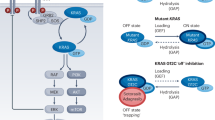Abstract
The serine-threonine kinase AKT1 is a central player in the oncogenic pathway controlled by PI3K. Recently, a somatic mutation in AKT1 (E17K) has been detected in breast, colorectal, lung and ovarian cancers. The E17K change results in constitutive AKT1 activation and induces leukaemia in mice. We determined the occurrence of the E17K variant in a panel of 764 tumour samples. These included breast, lung, ovarian, colorectal and pancreatic carcinomas as well as melanomas and glioblastomas. Despite the fact that these tumours are known to bear alterations in genes involved in the PI3K signalling pathway, AKT1E17K was detected only in breast (16/273), colorectal (1/88) and lung (1/155) cancers. Within the neoplasms of breast origin, the AKT1E17K variant was mutually exclusive with respect to the PIK3CAE454KorH1047R alleles and was present only in ductal and lobular histotypes. Our results, showing that AKT1 mutations seem to occur in a tissue-specific fashion have basic and clinical implications. First, the activity of mutated AKT1 in oncogenic PI3K signalling could be strictly dependent on the cell and tissue milieu. Second, therapeutic efforts aimed at selective targeting the AKT1E17K variant could be effective mainly in specific cancer types.
This is a preview of subscription content, access via your institution
Access options
Subscribe to this journal
Receive 50 print issues and online access
$259.00 per year
only $5.18 per issue
Buy this article
- Purchase on Springer Link
- Instant access to full article PDF
Prices may be subject to local taxes which are calculated during checkout
Similar content being viewed by others
References
Balakrishnan A, Bleeker FE, Lamba S, Rodolfo M, Daniotti M, Scarpa A et al. (2007). Novel somatic and germline mutations in cancer candidate genes in glioblastoma, melanoma, and pancreatic carcinoma. Cancer Res 67: 3545–3550.
Barbareschi M, Buttitta F, Felicioni L, Cotrupi S, Barassi F, Del Grammastro M et al. (2007). Different prognostic roles of mutations in the helical and kinase domains of the PIK3CA gene in breast carcinomas. Clin Cancer Res 13: 6064–6069.
Benvenuti S, Frattini M, Arena S, Zanon C, Cappelletti V, Coradini D et al. (2008). PIK3CA cancer mutations display gender and tissue specificity patterns. Hum Mutat 29: 284–288.
Brugge J, Hung MC, Mills GB . (2007). A new mutational AKTivation in the PI3K pathway. Cancer Cell 12: 104–107.
Carpten JD, Faber AL, Horn C, Donoho GP, Briggs SL, Robbins CM et al. (2007). A transforming mutation in the pleckstrin homology domain of AKT1 in cancer. Nature 448: 439–444.
Frattini M, Signoroni S, Pilotti S, Bertario L, Benvenuti S, Zanon C et al. (2005). Phosphatase protein homologue to tensin expression and phosphatidylinositol-3 phosphate kinase mutations in colorectal cancer. Cancer Res 65: 11227.
Guldberg P, thor Straten P, Birck A, Ahrenkiel V, Kirkin AF, Zeuthen J . (1997). Disruption of the MMAC1/PTEN gene by deletion or mutation is a frequent event in malignant melanoma. Cancer Res 57: 3660–3663.
Karakas B, Bachman KE, Park BH . (2006). Mutation of the PIK3CA oncogene in human cancers. Br J Cancer 27: 455–459.
Li J, Yen C, Liaw D, Podsypanina K, Bose S, Wang SI et al. (1997). PTEN, a putative protein tyrosine phosphatase gene mutated in human brain, breast, and prostate cancer. Science 275: 1943–1947.
Malanga D, Scrima M, De Marco C, Fabiani F, De Rosa N, de Gisi S et al. (2008). Activating E17K mutation in the gene encoding the protein kinase AKT in a subset of squamous cell carcinoma of the lung. Cell Cycle 5: 665–669.
Saal LH, Holm K, Maurer M, Memeo L, Su T, Wang X et al. (2005). PIK3CA mutations correlate with hormone receptors, node metastasis, and ERBB2, and are mutually exclusive with PTEN loss in human breast carcinoma. Cancer Res 65: 2554–2559.
Samuels Y, Wang Z, Bardelli A, Silliman N, Ptak J, Szabo S et al. (2004). High frequency of mutations of the PIK3CA gene in human cancers. Science 304: 554.
Schonleben F, Qiu W, Ciau NT, Ho DJ, Li X, Allendorf JD et al. (2006). PIK3CA mutations in intraductal papillary mucinous neoplasm/carcinoma of the pancreas. Clin Cancer Res 12: 3851–3885.
Wood LD, Parsons DW, Jones S, Lin J, Sjoblom T, Leary RJ et al. (2007). The genomic landscapes of human breast and colorectal cancers. Science 318: 1108–1113.
Acknowledgements
We thank Dr T Hulsebos and Professor Dr Troost for making glioblastoma tumour samples available. We thank Dr S Pilotti and Dr M Pierotti for providing the colorectal cancer samples. This work was supported by grants from Italian Association for Cancer Research (AIRC, A Bardelli), Italian Ministry of Health, Regione Piemonte (A Bardelli), Italian Ministry of University and Research and Association for International Cancer Research (AICR-UK, A Bardelli), EU FP6 contract 037297 (A Bardelli) and MolDiagPaca (AS). FB is supported by a Netherlands Genomic Initiative Fellowship.
Author information
Authors and Affiliations
Corresponding author
Rights and permissions
This article is cited by
-
Targeting Akt in cancer for precision therapy
Journal of Hematology & Oncology (2021)
-
Understanding and overcoming tumor heterogeneity in metastatic breast cancer treatment
Nature Cancer (2021)
-
Characterization and comparison of genomic profiles between primary cancer cell lines and parent atypical meningioma tumors
Cancer Cell International (2020)
-
Distinct functions of AKT isoforms in breast cancer: a comprehensive review
Cell Communication and Signaling (2019)
-
SETDB1-mediated methylation of Akt promotes its K63-linked ubiquitination and activation leading to tumorigenesis
Nature Cell Biology (2019)



